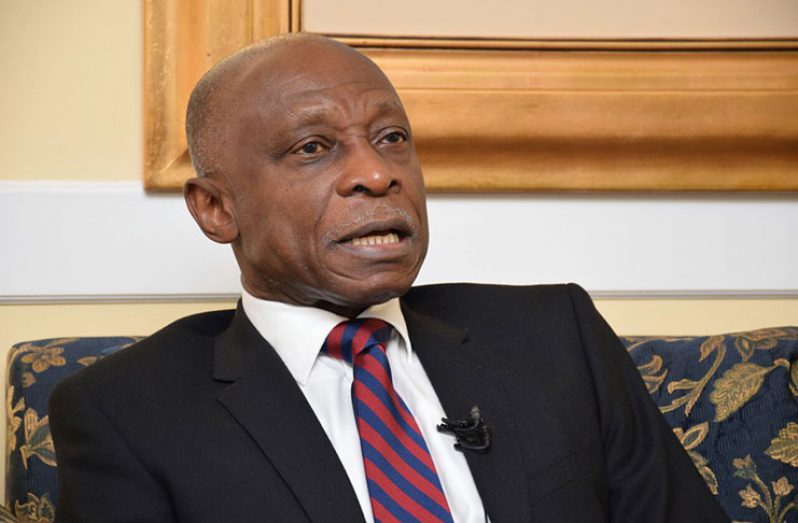GOVERNMENT on Friday said it is committed to facilitating returnees to its shores and ensuring that indigenous peoples enjoy their rights as enshrined in the country’s constitution, but cautioned that the matter is not straightforward.
The Ministry of Foreign Affairs on Friday said that there are several security, as well as legal issues to be taken into consideration in such matters. “Not every indigenous person coming out of Venezuela, or Suriname for that matter, has a claim to Guyanese citizenship. Not every Guyanese has a right to land that their father, let alone other forbears, may have claimed. It goes without saying that not everyone approaching Guyana’s borders and claiming to be Guyanese can have rights to our land,” the ministry said in a statement.
Over the past two weeks, reports have surfaced of several groups comprising persons reportedly of Guyanese heritage have re-migrated to Guyana and are seeking to take up occupancy of particular lands in Region Seven. On Wednesday, the bi-partisan Parliamentary Committee on Foreign Affairs called on Ministers of Foreign Affairs and Citizenship, Carl Greenidge and Winston Felix respectively, to state among other things, the number of Guyanese returning from Venezuela, and what programmes have been put in place to help them reintegrate.
It is estimated that approximately 300 Guyanese and Venezuelans with Guyanese parentage have returned to Guyana as a result of that country’s economic turmoil. Cabinet has asked several ministries and agencies to investigate the situation of persons entering Guyana from Venezuela due to the economic turmoil in that country. According to reports, many of those persons who have come from Venezuela claim that they are Guyanese and are owners of land through their parents or other relations.
But while an investigation has been launched, the citizenship of those persons who have entered Guyana through unofficial means is yet to be determined. The said persons have claimed that the lands upon which they have now settled belonged to their ancestors and are seeking to occupy same completely.
“Any person seeking to enter Guyana on the basis of Guyanese nationality has to prove that claim. It is the applicant’s responsibility to submit proof of citizenship. It goes without saying that birth certificates and proof of emigration to Venezuela on the claimed dates would assist. If these persons are Guyanese by birth or descent, it is odd that none of them have been able to prove their citizenship to the satisfaction of immigration authorities since they have been at our borders. Without this proof, they are not entitled to enter Guyana, save as indicated by the Ministry of Foreign Affairs at the discretion of the immigration authorities, namely for six months, in the first instance,” the ministry said.
The Foreign Affairs Ministry has made it clear that there can be no claim to assets in such cases and noted that without safeguards in place, Guyana would be faced with foreigners laying claim to their right to enter Guyana and to rights only intended for Guyanese.
“Guyanese citizenship is based on place of birth or on the citizenship of parents, among others. It is not based on ethnicity and has to be supported by documentation. Just as we do not know whether these persons are Guyanese, we do not know whether they actually hold Venezuelan citizenship or how and when it was acquired,” the ministry noted.
Moreover, the ministry said if the said group of persons are indeed Guyanese under the law, “it does not follow that they are entitled to any land which they claim, or which their parents or relatives may have occupied. If the land they wish is occupied as they claim, the law provides for conflicting claims to it to be resolved.”
The statement reminded that conflicts relating to assets and in particular, land, should be resolved by the courts and in such cases allowance has to be taken of beneficial occupation, investment as well as the legality of the transfer of assets. “No returnee therefore can have an automatic right to land or a gold mine in Guyana. The legislation relating to re-migrants and related groups does not grant such rights, whether they are claimed by indigenous peoples or any other community.
“Neither the constitution nor existing legislation provides re-migrants or returning Guyanese with such lands that they might claim or deem desirable to own.”
The ministry is calling on those persons claiming ownership of lands here and encamped on both sides of Guyana’s borders to state the basis of their claims regarding the lands on which they wish to settle. “Who actually holds the formal title to such land? Why, of all the land that may be available in Guyana, do they require land on which there is currently a gold-mining operation? Why would the entire village have left such land or economic operation in the first place? If their departure was really prompted by a need to educate their children, wouldn’t the income from the mining have helped with that goal?”
The Foreign Ministry questioned “what are their rights compared with the rights of those persons who were left behind and are unquestionably Guyanese?” Even if the identified group of persons did leave Guyana for betterment as is claimed and have become Venezuelans.
The ministry reminded that Guyana has laws regarding citizenship and privileges of re-migrating Guyanese, while noting that laws related to remigration here relate to fiscal incentives and discretionary concessions that may be granted by the state. “They do not give re-migrants special privileges over other Guyanese, whatever their ethnicity.” Additionally, the ministry said, it is concerned about the “casual acceptance of unproven assumptions” by the author of reports on this matter.



.jpg)









